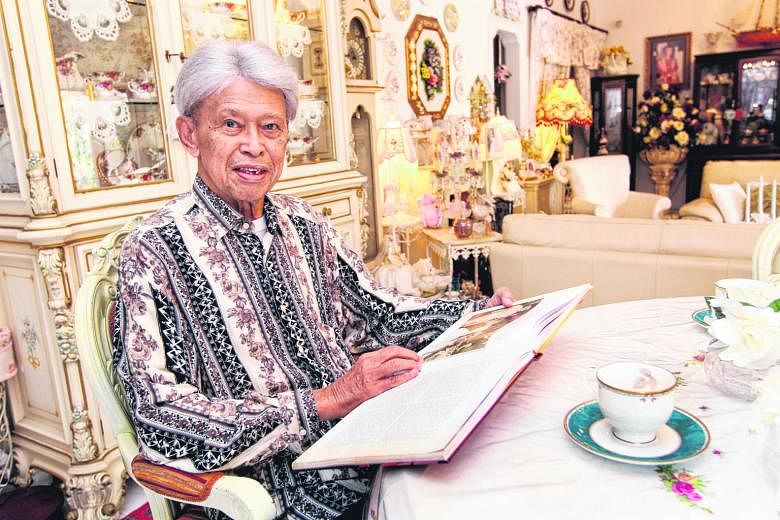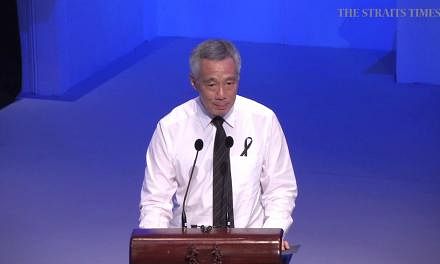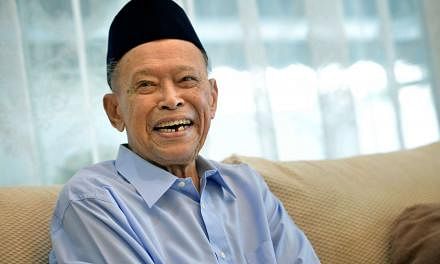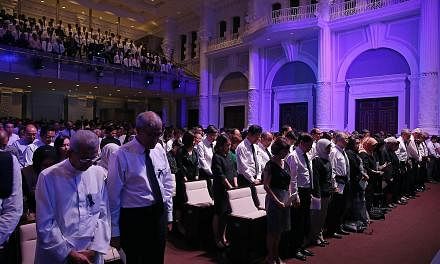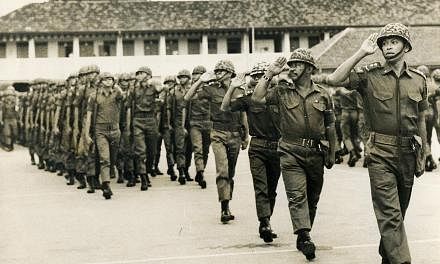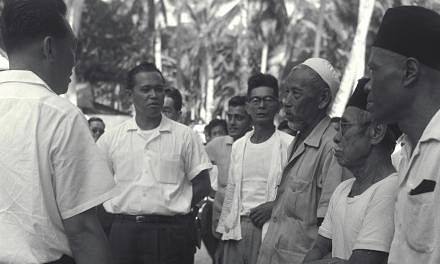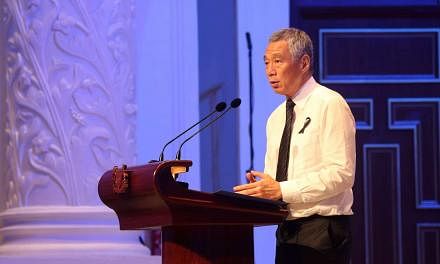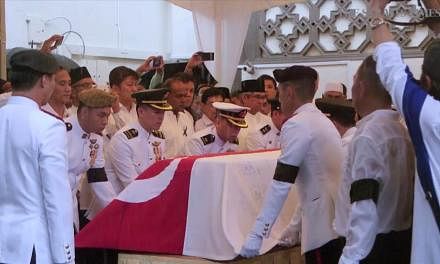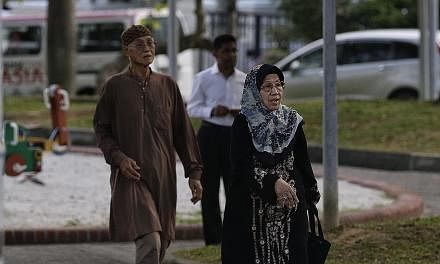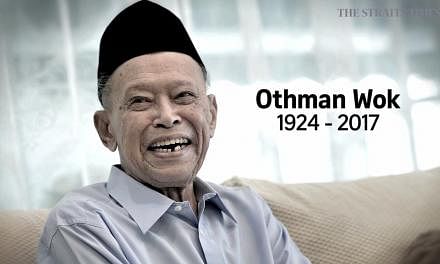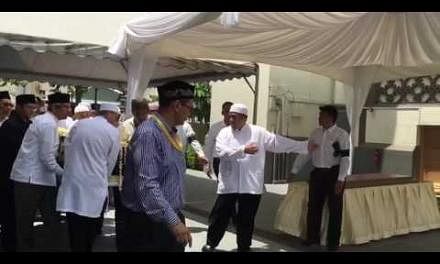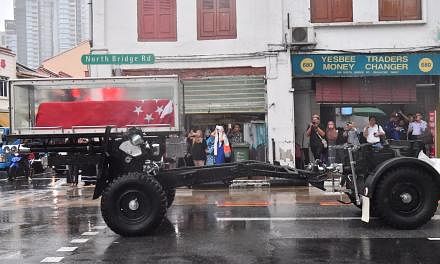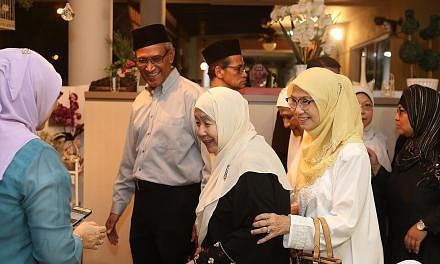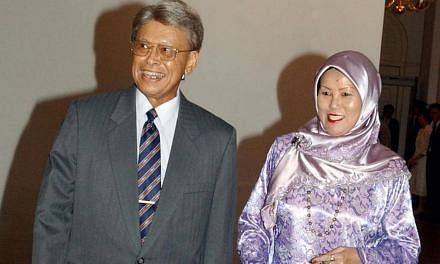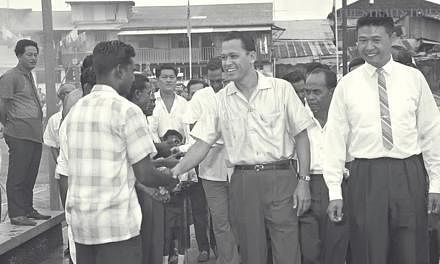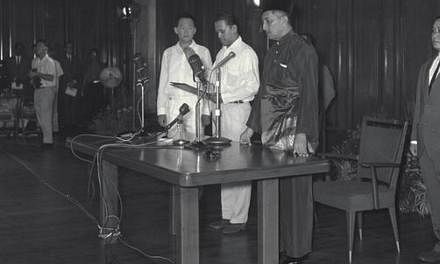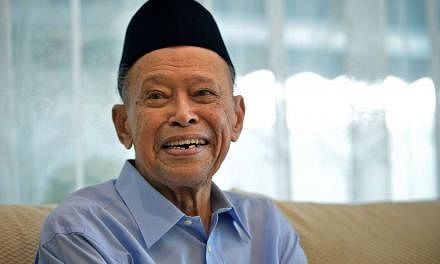When pioneer generation minister Othman Wok was a boy, it was his nightly duty to soothe his maternal grandfather's sore muscles by stepping all over the latter's back.
As young Othman worked on him, the old man would regale his grandson with stories of his own father's derring-do, such as when the latter fended off a tiger in a thicket near Serangoon with just a parang.
Mr Othman's great-grandfather, whom he named only as Awang, had been hurt so badly that a village healer had to dress his wounds and pray over him. He recovered.
Mr Othman never faced a wild animal himself, but he saw plenty of blood being spilt in Singapore's worst race riots on July 21, 1964.
He also suffered many an assassination on his character in his 18 years in politics, standing up for a multiracial Singapore, where he was denounced by Malay supremacists as an "infidel" and "traitor to the Malay race".
He never wavered.
He was threatened repeatedly as an election candidate for the multiracial People's Action Party (PAP) instead of the United Malays National Organisation (Umno).
The death threats intensified in the fractious months leading to Singapore leaving Malaysia and becoming an independent nation in August 1965.
One such missive was from an anonymous Malay letter-writer using the nom de plume Anak Singapura in early July 1964: "At this time you are a traitor to the community and religion… If you persist in doing this to the Malays, we dare to sharpen the long parang that you've been asking for."
That same month, Umno leader Syed Jaafar Albar said in a July 12 speech in Pasir Panjang to thousands of Malays: "If there is unity, no force in this world can trample us down, no force can humiliate us, no force can belittle us... not one Lee Kuan Yew, a thousand Lee Kuan Yews… we finish them off… kill him, kill him. Othman Wok and Lee Kuan Yew." Mr Syed Jaafar's words were, ironically, published in Utusan, the newspaper at which Mr Othman had worked as a journalist for 17 years.
Pasir Panjang was Mr Othman's constituency, which he won in a general election in September 1963.
He quit journalism shortly after, when Mr Lee appointed him minister for social affairs, making him the only Malay in the Cabinet then. He was, however, not Singapore's first Malay Cabinet minister, as the late Ahmad Ibrahim had been minister for health, and then labour, between 1959 and 1962.
Nine days after Mr Syed Jaafar's invective, at around 4.30pm on July 21, 1964, Singapore's worst racial riots erupted. Mr Othman was then leading a PAP contingent in a procession from the Padang to Lorong 12, Geylang, to celebrate the Prophet Muhammad's birthday.
When Chinese and Malays began hurling bottles at one another and punching policemen, Mr Othman led his group to safety in the old Kallang Airport building - and called his comrades in Cabinet to impose a curfew. A total of 23 people were killed and 454 injured.
A week later, a former Utusan colleague admitted to him that he had known the riots would break out - a good two hours before they happened. In Mr Othman's 2000 biography Never In My Wildest Dreams, he recalled his colleague telling him: "We knew beforehand. We have our sources, you know."
Mr Othman mused later in Men In White, the 2010 book on the history of the PAP: "I believe the riot was planned; it did not start spontaneously. They were very smart to choose a religious procession so that if we had stopped it, we would be called anti-Muslim. The inflammatory communal and racial speeches made by Malaysian Umno leaders worked up Malay sentiments in Singapore."
In the aftermath of the riots, Mr Lee relied heavily on Mr Othman, his old unionist friend whom he found "capable, dedicated and with integrity", to defuse tensions among Singapore's various races.

MAKING A DIFFERENCE
Mr Othman had met Mr Lee in 1952, in the office of his Utusan colleague Samad Ismail, who was then Mr Lee's confidant. "I found him to be a very friendly man, but very stern. He readily listens to what you say, but you must have substance," recalled Mr Othman of Mr Lee, who was then Utusan's legal adviser, in his 2000 biography.
In later years, Mr Lee got the workaholic journalist, who focused so much on landing scoops that he often forgot to cut his hair, to translate his speeches into Malay, edit PAP's news magazine Petir and help at its Malay Affairs Bureau.
At a flood-lit Padang past midnight on June 3, 1959, right after colonial governor William Goode declared Singapore self-governing, it was Mr Othman whom Mr Lee entrusted to make the new government's first official speech, which was in Malay, followed by speakers in Mandarin, Tamil and English.
Mr Othman's signature is among the 10 from PAP ministers on the Independence of Singapore Agreement 1965. In Men In White, he recalled: "PM called me into a room and asked me if I was prepared to sign the Separation declaration."
The query stemmed from two concerns. First, some among Mr Lee's colleagues, including Dr Toh Chin Chye and Mr S. Rajaratnam, were furious about having to separate when they had worked so hard to achieve merger with Malaysia on Sept 16, 1963.
Second, and perhaps most significantly, separation meant that, overnight, the Malay-Muslim community would go from being a majority to a minority on Aug 9, 1965. Singapore's Malays had then also begun to clamour for special privileges on a par with Malaysia's bumiputeras.
Malaysian Prime Minister Tunku Abdul Rahman was offering Singapore's Malays land in Johor as well.
Mr Othman told Mr Lee that he would sign the 1965 agreement without hesitation.
To Mr Lee, his old friend's long unshakeable belief in a multi-racial Singapore mattered a great deal.
It was thanks to Mr Othman's charismatic leadership and solid support for PAP's incorruptibility and its vision of a better life for all Singaporeans, that no Malay PAP member joined Barisan or Umno.
A tearful Mr Lee recalled that at his 75th birthday dinner in 1998, and paid tribute to Mr Othman: "Because of the courage and leadership you showed, not a single PAP leader wavered. That made a difference to Singapore."
Mr Othman was initially keener on remaining a journalist than becoming a politician. Modest to a fault, he shunned the spotlight but, throughout his life, was often thrust into it. When, for instance, he received no acknowledgement for his application to be a PAP member in 1954, the year it was inaugurated, he shrugged it off. It was only in 1958, when Mr Lee got him to chair PAP's Geylang Serai-Changi branch, that he realised his application had been accepted.
Up till then, he was, in his words, "politically apathetic", even when, as the secretary of the Singapore Printing Employees' Union from 1952, he fought for higher wages and better working conditions for workers of all races.
REGARDLESS OF RACE, LANGUAGE OR RELIGION
Through it all, Mr Othman never wavered in his belief that only a nation that respected all its races would work. He abjured extremism of any kind, having watched the Hock Lee bus rioters in May 1955 had their flesh torn by granite chips churned up by high-pressure water jets aimed at them.
In 1958, he recoiled when he visited kampungs in Changi full of children sporting red scarves and singing songs lustily in praise of communism.
Mr Othman, who had four daughters from two marriages, was born into a family of orang laut, who were the original settlers of Singapore. "When Raffles landed in Singapore," he told The New Paper in 2000, "some of my relatives were standing there on the beach. We were here before this place was discovered by the British... That's why when I talk to young people about the history of our country, it really means something to me."
His orang laut blood, he once said half in jest, gave him strong sea legs, but no stomach for air travel, which he had to do a lot of as minister for social affairs from 1963 to 1977, and then as Singapore's ambassador to Indonesia from 1977 till his retirement from politics in 1981.
As the social affairs minister, it fell to him to sell government policies the Malays, especially, found hard to take.
When Malay businessmen asked the Government for financial support, Mr Lee responded that giving them such help would be like only giving them fish. Better, the prime minister said, for them to learn how to fish.
So, on Mr Othman's advice, the Government gave all Malays free primary-to-tertiary education - one of many initiatives to help the community. In 1990, this policy no longer applied to those in university.
When kampungs had to make way for public housing in Singapore, a Kuala Lumpur-based editor of Mr Othman's former employer, Utusan, demanded: "Do you expect Malays to live in flats? Where would they put their goats and chickens?"
Mr Othman replied that they would, with the Government's help, have to adapt to urban society.
A genial, patient man who was slow to anger and quick to mend fences, he was, in his own words, "good with people". That came from experiences that few of his fellow Malays had.
In 1949, the year he married his first wife Daliah "Cik Dah" Mohd Noor, he was often in the jungles of Pahang, covering the guerrilla war between the Malayan Communist Party and the British colonial power, as Utusan Melayu's war correspondent. Fortunately, he never had to stare into the jaws of tigers, unlike what had befallen his great-grandfather.
Once, in the Chinese squatter village of Triang in Pahang, he was embedded in a platoon of an RAF regiment, and watched as some of its soldiers fired indiscriminately, even at women and babies. "Throughout the operation, no communist appeared. It was all a mistake and innocent people paid for it." Enraged, he wanted to report on the killings but was warned by the troops' commander against doing so, he said in his 2000 biography.
Cik Dah bore him three daughters: Saffiah in 1950, Dahlia in 1951 and Lily in 1956. He had another daughter, Diana, in 1981 with his second wife Lina Abdullah, now 70.
Mr Othman is survived by his wife Lina, daughters, a stepdaughter, seven grandchildren, two great-grandsons and three stepgrandchildren.
His knack for getting along with everyone was evident in London, where he was on scholarship to study journalism for a year, weathering the chill in leather gloves that were a gift from Mr Yusof Ishak, his boss at Utusan who was the founder, editor-in-chief and managing director of the newspaper.
In London, he got on famously with a disparate group surrounding him, from his Polish landlady to Kuala Lumpur-born roommate Thor Beng Chong and housemate Lynden Pindling, who would later become prime minister of the Bahamas.
In June 1959, after the PAP won the right to govern Singapore, he was the friend whom Mr Lee asked about the suitability of Mr Yusof as head of state. In 1985, he was the first person his old friend Wee Kim Wee called to ask if he should accept Mr Lee's offer to be Singapore's fourth president.
As chief reporter of Utusan between 1946 and 1963, Mr Othman was the reporter to whom the Dalai Lama and Malayan Communist Party leaders Fang "The Plen" Chuang Pi and Lim Ah Leong readily gave exclusive interviews.
It helped that he was urbane and had the look of a matinee idol. When he first campaigned in 1959 to represent PAP in Kampong Kembangan, an Umno stronghold in Singapore, he and Cik Dah trudged through a sea of scowls. So he was surprised he lost to Umno stalwart Ali Alwi by just 200 votes.
Umno's man in Singapore then, Mr Khir Johari, mused afterwards in an interview cited in Men In White that Umno assemblymen had, unlike Mr Othman, "neglected to visit the kampungs, talk to the people and find out what their needs were".
Mr Othman, whose memory was sharp till the end, recalled in his 2000 biography: "At the post-election meeting at the Hokkien Community Hall, I met Lee Kuan Yew and I said I was sorry I lost. He told me not to worry because he knew that if he had not put me there, we would have lost by more votes."
As the Men In White authors Sonny Yap, Richard Lim and Leong Weng Kam noted: "Othman Wok lived through it all, as a minister in Lee's Cabinet, during the struggle with the communists, the Merger, the race riots and the trauma of Separation."
Mr Othman told them: "Those were the toughest times. Without Lee, we could have collapsed under all those pressures, particularly with the problems under Malaysia."
He was modest about his own contributions; without him, too, Singapore might not be what it is today.
As Associate Professor Syed Muhd Khairudin Aljunied, who has studied Singapore's Malay intelligentsia, says: "Othman was Singaporean first and Malay second. And he never forgot his roots as a Muslim."
Long after his retirement from public life, young and old would tap Mr Othman's experiences as a Singaporean. He was enlisted to speak about his lessons for the future and, perhaps most importantly, at dialogues on Racial Harmony Day every July 21 - the very same date that Singapore's worst race riots erupted all those years ago.
Correction note: This story has been edited for clarity. An earlier version which mentioned Mr Othman Wok's steadfastness in championing a multi-racial Singapore was in reference to the 1965 separation from Malaysia, and not the 1961 Big Split in the PAP, when 12 Chinese and one Indian PAP assemblymen joined the breakaway Barisan Sosialis.
